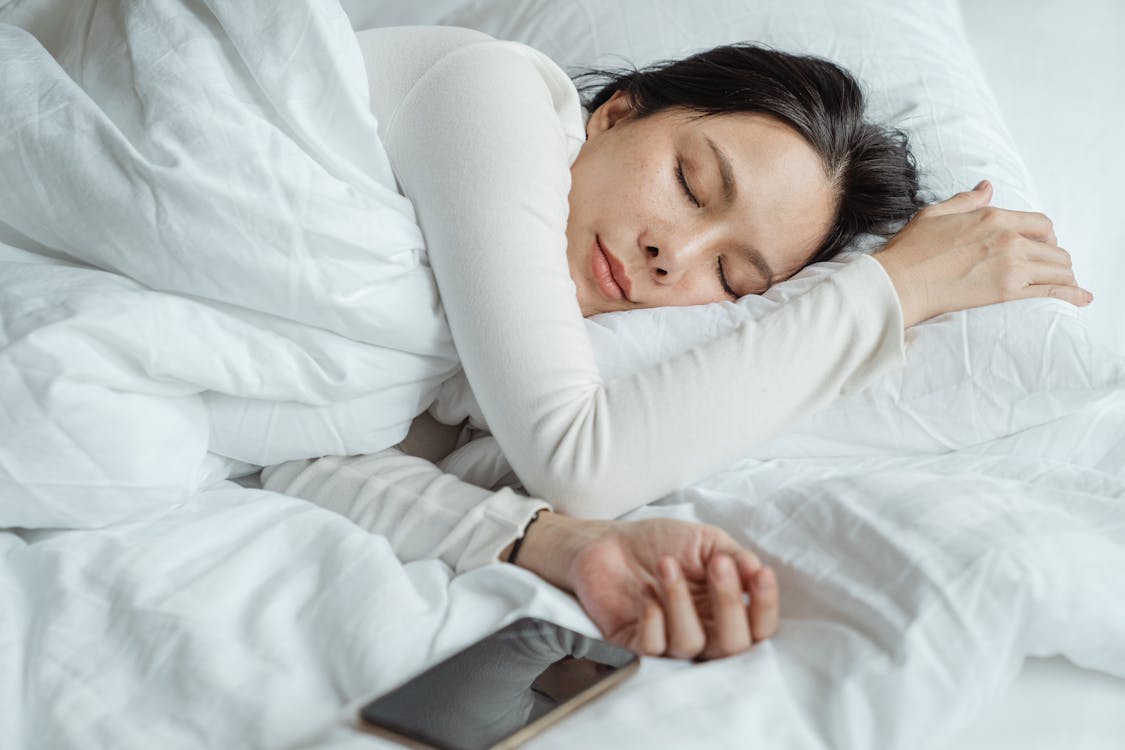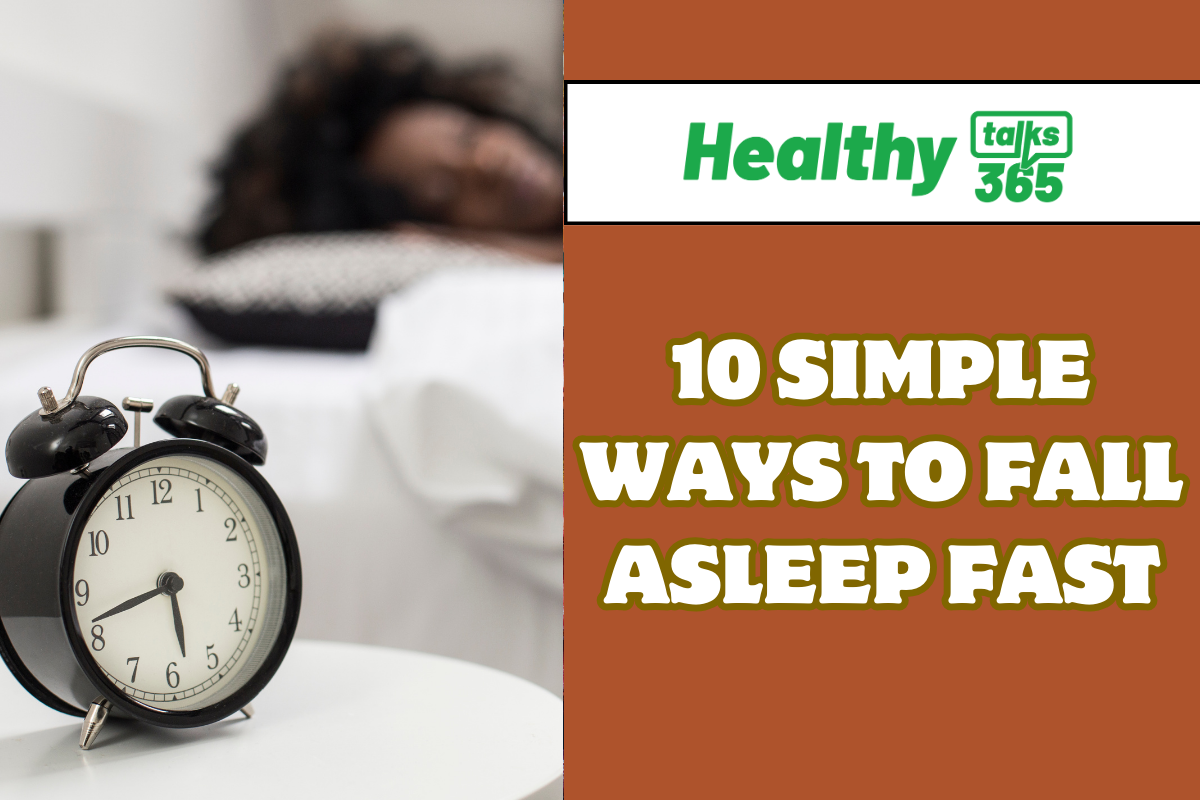10 SIMPLE WAYS TO FALL ASLEEP FAST
1. Establishing a Routine can help to fall asleep fast
Creating and sticking to a consistent bedtime routine can indeed be beneficial for falling asleep quickly and achieving a restful night’s sleep. By establishing a series of calming activities leading up to bedtime, such as dimming the lights, practicing relaxation techniques like deep breathing or meditation, and avoiding stimulating activities or screens, you signal to your body and mind that it’s time to wind down and prepare for sleep. This routine can help regulate your internal clock, known as the circadian rhythm, promoting a more predictable sleep-wake cycle.

2. Create a Relaxing Bedtime Ritual to easily fall asleep
Crafting a tranquil bedtime ritual tailored to your preferences and needs can be a potent strategy for promoting restful sleep and easing into a peaceful slumber. Begin by setting the stage for relaxation in your sleep environment.
Dim the lights to signal to your body that it’s time to wind down, and create a cozy atmosphere with soft bedding and comfortable pillows. Engage in activities that soothe the mind and body, such as gentle stretching or yoga poses to release tension accumulated throughout the day.
Follow this with a warm bath or shower to relax muscles and cleanse away the day’s stressors. As you prepare for bed, indulge in a calming bedtime snack, such as a cup of herbal tea or a small serving of warm milk, known for their sleep-promoting properties. Incorporate mindfulness or meditation techniques to quiet the mind and foster a sense of inner calm.
3. Limiting Screen Time can help in promoting good sleep
Reducing screen time, particularly in the hours leading up to bedtime, is a valuable strategy for improving sleep quality and promoting overall well-being.
Excessive exposure to screens, such as smartphones, tablets, computers, and televisions, can disrupt the body’s natural sleep-wake cycle by emitting blue light, which suppresses the production of melatonin, the hormone that regulates sleep.
By limiting screen time, especially in the evening, you give your brain the opportunity to unwind and prepare for restorative sleep. Instead of scrolling through social media or watching TV shows, consider engaging in relaxing activities that promote sleep, such as reading a book, practicing gentle yoga or meditation, or enjoying a soothing bath.
4. Create a Comfortable Sleep Environment to fall asleep easily
Establishing a comfortable sleep environment is essential for promoting easy and restful sleep. Start by optimizing your bedroom for relaxation and tranquility. Choose a comfortable mattress and pillows that support your body and promote proper alignment.
Keep the room cool, dark, and quiet to create an atmosphere conducive to sleep. Consider using blackout curtains or an eye mask to block out light, and use earplugs or a white noise machine to mask any disruptive sounds.
Personalize your sleep environment with calming decor, such as soothing colors, soft textures, and pleasant scents like lavender, which has been shown to promote relaxation and improve sleep quality.
Read Also:
Tips for a Good Night’s Sleep: Creating a Relaxing Bedtime Routine
5. Limiting Daytime Naps can be a good factor in falling asleep fast
Limiting daytime naps can play a significant role in facilitating the ability to fall asleep quickly at night. While brief naps can offer a rejuvenating break during the day, excessive or prolonged napping can disrupt the body’s natural sleep-wake cycle, making it more challenging to fall asleep at bedtime.
By reducing the duration and frequency of daytime naps, you can increase your overall sleep drive and ensure that your body is sufficiently tired by the time evening arrives. Instead of relying on naps to compensate for inadequate nighttime sleep, focus on establishing a consistent sleep schedule and practicing good sleep hygiene habits.
6. Exercise Regularly to attain good sleep cycle
Regular exercise plays a vital role in maintaining a healthy sleep cycle and promoting restful sleep. Engaging in physical activity during the day helps to regulate the body’s internal clock, known as the circadian rhythm, which governs the sleep-wake cycle.
Exercise not only helps to expend energy and reduce feelings of restlessness but also triggers the release of endorphins, chemicals in the brain that promote relaxation and elevate mood. Additionally, consistent exercise has been shown to improve sleep quality by enhancing the duration and depth of sleep, as well as reducing the frequency of nighttime awakenings. However, it’s important to note that the timing of exercise can also impact sleep.

7. Good diet promotes good sleep
Maintaining a healthy and balanced diet is crucial for promoting good sleep and overall well-being. The foods we consume can have a significant impact on our sleep quality and patterns.
Certain nutrients, such as tryptophan, magnesium, and melatonin, found in foods like turkey, bananas, nuts, seeds, and tart cherries, have been linked to improved sleep quality and regulation of the sleep-wake cycle. Additionally, foods rich in complex carbohydrates, such as whole grains, fruits, and vegetables, can help regulate blood sugar levels and promote stable energy levels throughout the day, which can contribute to better sleep at night.
Conversely, consuming large meals or spicy or acidic foods close to bedtime may lead to discomfort and disrupt sleep. Similarly, caffeine and alcohol intake should be moderated, as they can interfere with sleep quality and duration.
Read Also:
Quick and Healthy Breakfast Ideas for a Busy Morning
8. Stress management helps to fall asleep fast
Effectively managing stress is essential for promoting the ability to fall asleep quickly and enjoy restful sleep.
High levels of stress and anxiety can significantly impact sleep quality and make it difficult to relax and unwind at bedtime. Incorporating stress management techniques into your daily routine can help alleviate tension and promote a sense of calmness that facilitates sleep onset.
Techniques such as deep breathing exercises, progressive muscle relaxation, mindfulness meditation, and yoga can help reduce physiological arousal and promote relaxation, making it easier to transition into sleep. Additionally, engaging in activities that bring joy and fulfillment, such as hobbies, spending time with loved ones, or enjoying nature, can help reduce stress levels and promote a positive mindset conducive to sleep.
9. Limit Stimulating Activities to get good sleep
Limiting stimulating activities before bedtime is essential for setting the stage for a restful night’s sleep. Engaging in stimulating activities, such as watching intense television shows or engaging in exciting video games, can increase alertness and make it difficult to unwind and relax. Additionally, exposure to bright lights from screens can suppress the production of melatonin, the hormone that regulates sleep, further disrupting the body’s natural sleep-wake cycle.
By limiting stimulating activities and exposure to screens in the hours leading up to bedtime, you can create a calmer environment that promotes relaxation and prepares the mind and body for sleep. Instead, opt for calming activities that promote relaxation, such as reading a book, taking a warm bath, or practicing gentle yoga or meditation.

10. Seek Professional Help
Seeking professional help is a proactive step towards addressing sleep difficulties and improving overall sleep quality. Sleep disorders and chronic insomnia can have a significant impact on physical health, mental well-being, and daily functioning.
Consulting with a healthcare professional, such as a primary care physician, sleep specialist, or mental health provider, can help identify underlying causes of sleep disturbances and develop an individualized treatment plan tailored to your specific needs.
Professional help may involve diagnostic testing, such as sleep studies, to assess sleep patterns and identify potential sleep disorders.




